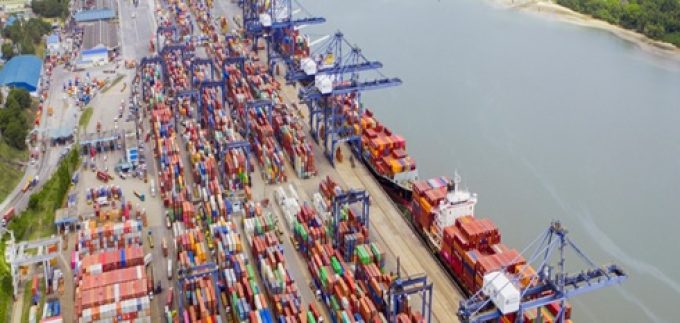CNBC: Adani Group shares nosedive after chairman Gautam Adani charged with fraud in New York
CNBC reports: India’s Adani Group saw shares of its companies plunge Thursday after its billionaire chairman Gautam ...
BA: WIND OF CHANGEMAERSK: BULLISH CALLXPO: HEDGE FUNDS ENGINEF: CHOPPING BOARDWTC: NEW RECORDZIM: BALANCE SHEET IN CHECKZIM: SURGING TGT: INVENTORY WATCHTGT: BIG EARNINGS MISSWMT: GENERAL MERCHANDISEWMT: AUTOMATIONWMT: MARGINS AND INVENTORYWMT: ECOMM LOSSESWMT: ECOMM BOOMWMT: RESILIENCEWMT: INVENTORY WATCH
BA: WIND OF CHANGEMAERSK: BULLISH CALLXPO: HEDGE FUNDS ENGINEF: CHOPPING BOARDWTC: NEW RECORDZIM: BALANCE SHEET IN CHECKZIM: SURGING TGT: INVENTORY WATCHTGT: BIG EARNINGS MISSWMT: GENERAL MERCHANDISEWMT: AUTOMATIONWMT: MARGINS AND INVENTORYWMT: ECOMM LOSSESWMT: ECOMM BOOMWMT: RESILIENCEWMT: INVENTORY WATCH

Adani Group, India’s largest port operator, continues to vigorously pursue its ambitious goal to become the world’s largest port operator by 2030.
The conglomerate, under port arm Adani Ports and Special Economic Zone (APSEZ), has won the concession to operate a container terminal at Tanzania’s largest cargo gateway, Dar es Salaam Port, for 30 years.
The deal is a progression of a joint-venture Adani established with AD Ports (Abu Dhabi Ports) in 2022, known as East Africa Gateway.
“Dar es Salaam is a gateway port with a well-connected network of roadways and railways,” said APSEZ.
“Adani Ports-led consortium will acquire the project company in Tanzania, which houses all port handling equipment and employees, for $39.5m,” it noted.
The terminal (CT2) has a designed capacity of 1m teu, and APSEZ said it handled some 820,000 teu last year.
“We are confident that, with our expertise and network in ports and logistics, we will be able to enhance trade volumes and economic cooperation between our ports and East Africa,” said APSEZ MD Karan Adani.
“We will boost trade volumes and economic ties with East Africa.”
According to industry observers, the allure for port-related investment in Tanzania largely stems from its “gateway access” to volumes moving in and out of the six land-locked countries of Malawi, Zambia, Democratic Republic of Congo, Burundi, Rwanda and Uganda.
Adani’s other recent global port deals include long-term concessions for Haifa Port in Israel and a container transhipment terminal at Sri Lanka’s Colombo Port. The latter is expected to begin phase 1 operations at the end of this year or early 2025, believed to be critical to easing the heightened capacity pressure on Colombo from a large spike in transhipment vessel calls because of Red Sea-linked reroutings.
In India, Adani’s most recent expansion push was a deal to acquire a 95% stake in Gopalpur Port, an emerging east coast gateway, for some $162m.
With countrywide terminal operations, spanning 14 port locations, the group is already close to controlling 50% of India’s containerised ocean trade, having captured some 44% of the market last fiscal year (2023-24).
The bulk of Adani’s container volumes comes via Mundra Port, which saw volumes swell 15% higher than its public competitor, Nhava Sheva, to reach 7.4m teu in 2023-24.
Transhipment activity by MSC, which has a container terminal partnership with Adani at Mundra, seems to be a major growth catalyst. According to available industry data, container transhipment flows at Mundra hit 1.7m teu last fiscal year, up from the 1.6m teu reported for 2022-23.
Adani is also betting high on its soon-to-be ready Vizhinjam Port in southern India, which arguably features all the essential traits, including natural deep water and geographical proximity to the busy east-west international shipping route, to emerge as a regional maritime hub, akin to Colombo.
Overall, APSEZ is targeting to handle 500 million tonnes of cargo by 2025, up from 420 mt in 2023-24, to gain 40% of the country’s ocean trade.
Listen to the recent episode of The Loadstar News in Brief Podcast to get a bite-sized recap of last week’s supply chain news:
Comment on this article